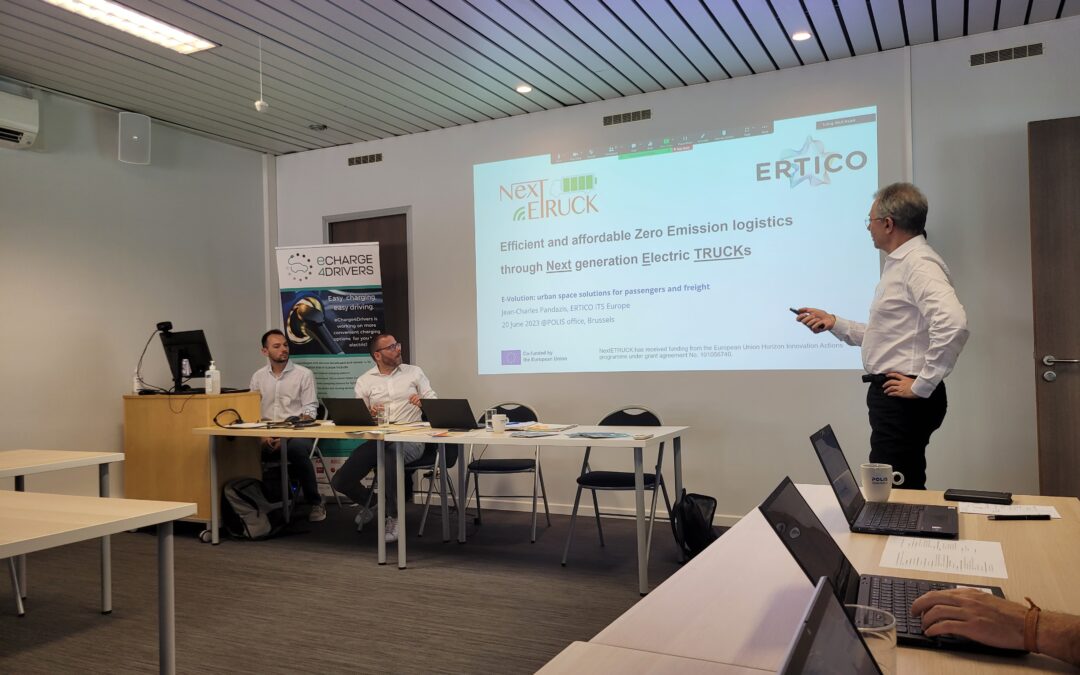About the “E-Volution” event
The Parking, Clean Vehicles & Air Quality, and Urban Freight working groups of POLIS recently held a two-day event (Day 1: EV Parking & Day 2: Electrification of heavy-duty vehicles), focusing on the future of electromobility and its impact on passenger and logistics transportation.
Overall, the two-day event provided valuable insights into the future of electromobility, with a focus on parking policy, the electrification of heavy-duty vehicles, and the challenges and opportunities associated with achieving sustainable urban mobility. By addressing these issues, policymakers and industry stakeholders can work together to create a supportive regulatory environment that promotes innovation while meeting cities and their citizens’ social, economic, and environmental needs.
During the second day, participants delved into the electrification of heavy-duty vehicles, showcasing several EU-funded projects aimed at decarbonising urban freight deliveries.
The discussion panel, composed of industry partners, vehicle manufacturers, and technical experts, explored the implications of new zero-emission heavy goods vehicles (HGVs) for the road transport industry.
NextETRUCK: flagship project in truck electrification
The NextETRUCK project was presented with ESCALATE. While NextETRUCK focuses on medium-sized trucks, ESCALATE aims to test long-distance freight solutions spanning 500 to 800 kilometres, including cross-border elements. NextETRUCK focuses solely on battery electric vehicle (BEV) solutions while ESCALATE examines hydrogen fuel cells and battery-powered solutions. The event was an opportunity for both projects to start building synergies.
NextETRUCK’s ambition and role
ERTICO presented NextETRUCK by highlighting its unique involvement of three original equipment manufacturers (OEMs) conducting tests on three trucks in three different locations. The three use cases in Barcelona, Utrecht, and Istanbul were showcased, along with the project’s overarching goal to explore the optimisation challenges in end-to-end distribution and foster innovation and collaboration in the field. The presentation also focused on the NextETRUCK key innovations:
- new electric powertrains for medium freight
- digital twinning to simulate and understand the vehicle’s behaviour, assess costs, and define optimal vehicle use
- an optimised design tool to assist fleet managers of medium-sized trucks in optimizing their operations by determining the required size of charging infrastructure.
NextETRUCK is spearheading the pledge to take action now and focus on vehicle efficiency and climate targets, making the best use of available innovations and technological advancements. This will be achieved by constantly assessing and monitoring its innovations to identify additional technology advancements. The main outcome of the project is expected to be a minimum 10% increase in energy efficiency compared to existing benchmarked battery electric vehicle (BEV) trucks of the same size category, with an envisioned market penetration and adoption between 2025 and 2028, with the possibility of new technologies and materials expanding the range of possibilities by 2030.
Concluding remarks and necessary steps
As a concluding session, a roundtable gathered recommendations from freight industry experts and practitioners on supporting zero-emission freight in cities. The suggestions included investing in a mix of last-mile deliveries and consolidation centres in urban environments, promoting cooperation between cities and the freight sector, integrating renewable energy production at logistic sites, and providing subsidies for zero-emission vehicle purchases. The session also highlighted the challenges of the limited availability of electric trucksl, the necessity to reconsider the deployment of charging stations, and the importance of mapping public and semi-public charging stations and assessing grid capacity, underscoring the need for comprehensive planning and infrastructure development in transport electrification.

